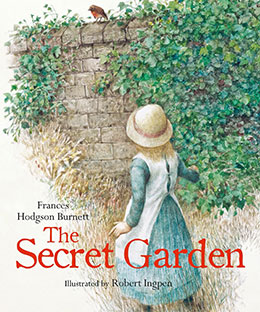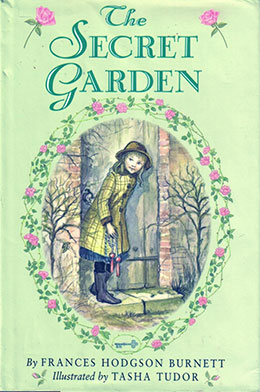Minnesota has experienced an interminable winter this year and somewhere in the midst of it I treated myself to what I thought was a newly illustrated volume of The Secret Garden by Frances Hodgson Burnett. Illustrated by Robert Ingpen, and in 2010, so not really new. It’s gorgeous. It has lifted my spirits through several snowstorms in March and April.
I’ve always loved this book — I still have my own battered mint-to-spring-green paperback, which has a few pencil sketches at the beginning of chapter done by Tasha Tudor. This “new” volume glories in art, however — pictures to go along with the story, as well as chapter openings bedecked with a botanical drawing of flowers from Yorkshire England where the story takes place — such a treat.
I remember reading this book to my kids when they were at just the age to take in the magic of all that happens in the secret garden, and what I remember about reading it aloud was that I “translated” the Yorkshire dialect, which I could not pronounce without it being a terrific distraction, into my plain American English. I could “hear” it myself in my head, but I couldn’t reproduce it. Occasionally I’d stop and try to deliver a line, but it was to everyone’s relief when I just went back to “translating” as we read. I don’t think it hurt the story — there’s lots of talk about the Yorkshire way of talking, and we read all that.
We read it all. Including the racist elements. Of which there are rather a lot. Mary Lennox’s attitude toward and language regarding the “natives,” “blacks,” and “darkies,” in India, where her story begins, is reprehensible. I remember stumbling when I read them out loud. I’d stop and we’d talk about how that way of talking about people was so ugly and wrong…but wasn’t known to be at the time … which was terrible, too. I’d wrap up the discussion paraphrasing Maya Angelou with a “when we know better, we must do better” maxim. Which I believe in wholeheartedly. Especially when it is hard to do.
Now that books are being banned and “revised” for language used before we “knew better,” I find myself thinking about this a lot. (See “As Classic Novels Get Revised for Today’s Readers, a Debate About Where To Draw The Line” in the New York Times). I read a lot of books from my childhood to my kids — all my beloved volumes. Many, if not most, have language in them I didn’t want my kids to use or think in. But I can’t think of a time (which doesn’t mean there wasn’t, of course) when I changed the words of the author — except when a dialect not my own would’ve been mocked by me reading it, as in The Secret Garden. I wonder how different my changing the dialect is from changing dated and offensive language…?
I don’t have an answer to these things … Some of our classics have not aged well in spots or in their entirety. Figuring out how best to address that is fraught on many levels. But I do know this: I treasure the discussions I had with my kids over books as much, if not more, than the actual reading of the books. Even when the discussions are uncomfortable, I’m glad to have had a contextual reason to have them.



Thank you for sharing these thoughts! I found them very relevant.
Times do change, and we change with them. I, too, loved THE SECRET GARDEN. You have inspired me to hunt through my overladen shelves and read it again.
That’s a good way to think about it – times change and we do with them (hopefully!)
Thanks for taking the time to say so!
I think your conversations with them were valuable. I think kids learn early on about the difference between kindness and meanness by the tone in what they hear. And they eventually see that times change for the better.
I do hope so!